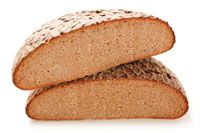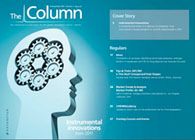Rye bread benefits
A recent study has been carried out to examine why postprandial insulin is lowered following the intake of rye bread compared with wheat bread.

A recent study has been carried out to examine why postprandial insulin is lowered following the intake of rye bread compared with wheat bread.1
A sourdough fermented endosperm rye bread and a standard white wheat bread were served to 16 healthy subjects, in test portion sizes of 50 g. Blood samples were taken over 4 hours to measure glucose and insulin concentrations. Gastric emptying rates were also measured. Changes in the plasma metabolome were examined by applying a comprehensive two-dimensional gas chromatography coupled to time-of-flight mass spectrometry metabolomics platform.
It was found that plasma insulin response to rye bread was lower than to wheat bread at 30, 45 and 60 min after intake, and plasma glucose response was significantly higher at 90 min after rye bread intake than wheat bread intake. The starch hydrolysis rate was higher for rye bread than wheat bread, contrary to the in vitro protein digestibility.
The study concluded that there were potential health benefits in rye bread linked to the changes in plasma amino acids and metabolites.
1. Kaija Poutanen et al., Nutrition Journal, 10, 116 (2011).
This story originally appeared in The Column. Click here to view that issue.
Measuring Vitamin K1 Concentrations in Dogs with Chronic Enteropathy Using LC–MS/MS
May 14th 2025A joint study between the University of Tennessee (Knoxville, Tennessee) and the University of Pennsylvania School of Veterinary Medicine (Philadelphia, Pennsylvania) compared directly measured vitamin K1 (vitK1) concentrations in healthy dogs and dogs with chronic enteropathy (CE) using liquid chromatography tandem mass spectrometry (LC–MS/MS); they also investigated whether supplementation of vitK1 in dogs with CE would significantly increase vitK1 concentrations.
HPLC 2025 Preview: Fundamentally Speaking (Part 2)
May 14th 2025Michael Lämmerhofer from the Institute of Pharmaceutical Sciences, University of Tübingen, Germany, spoke to JFK Huber Lecture Award winner of 2024 Torgny Fornstedt, professor in analytical chemistry and leader of the Fundamental Separation Science Group, Karlstad University, Sweden, about his pioneering work in high performance liquid chromatography (HPLC) with a focus on fundamentals, ion-pair chromatography, and oligonucleotide applications.
HPLC 2025 Preview: Fundamentally Speaking (Part 1)
May 13th 2025Michael Lämmerhofer from the Institute of Pharmaceutical Sciences, University of Tübingen, Germany, spoke to JFK Huber Lecture Award winner of 2024 Torgny Fornstedt, professor in analytical chemistry and leader of the Fundamental Separation Science Group, Karlstad University, Sweden, about his pioneering work in high performance liquid chromatography (HPLC) with a focus on fundamentals and industrial applications.

.png&w=3840&q=75)

.png&w=3840&q=75)



.png&w=3840&q=75)



.png&w=3840&q=75)










